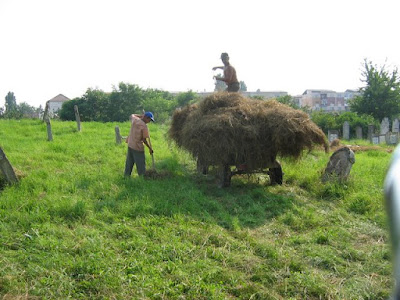 |
| Caretakers in Alba Iulia, Romania, cut hay in the Jewish cemetery. Photo (c) Ruth Ellen Gruber |
By Ruth Ellen Gruber
The Washington Post recently ran an interesting article about what can happen to a cemetery in an isolated area when its elderly caretaker can no longer take care. This is a common problem with Jewish cemeteries in some parts of Eastern Europe, where -- as in Romania, for example -- the small Jewish communities often contracted with local peasants to cut the weeds and maintain Jewish cemeteries in places where few or no Jews now live in exchange for housing onsite, or use of the hay or part of land where there are no burials. As these people age and pass away, the cemeteries may be left untended.
The article, by J. Freedom du Lac, was not about a Jewish cemetery in eastern Europe -- but about an African-American cemetery in rural Virginia whose longtime caretaker, Vernon Peterson, is now 80.
It’s what happens afterward, when he’s no longer around to look after Rock Hill Cemetery. For nearly half of its existence, the 122-year-old cemetery — where generations of local African American families are interred — has been carefully tended by Peterson, a fastidious Korean War veteran who grew up nearby in a country village that’s long since disappeared.
But Peterson is 80, and he can’t stop wondering: Who will care for this little-known repository of community and family history when he’s gone?
There are thousands of graveyards scattered across Virginia, many of them small family burial plots on private properties, according to preservationists and historians. Some date to the founding of Jamestown more than 400 years ago.
But they’re increasingly endangered as a generation of caretakers dies off and people with kin buried out back sell off their family land. The burial sites can become overgrown and, eventually, consigned to oblivion.




No comments:
Post a Comment